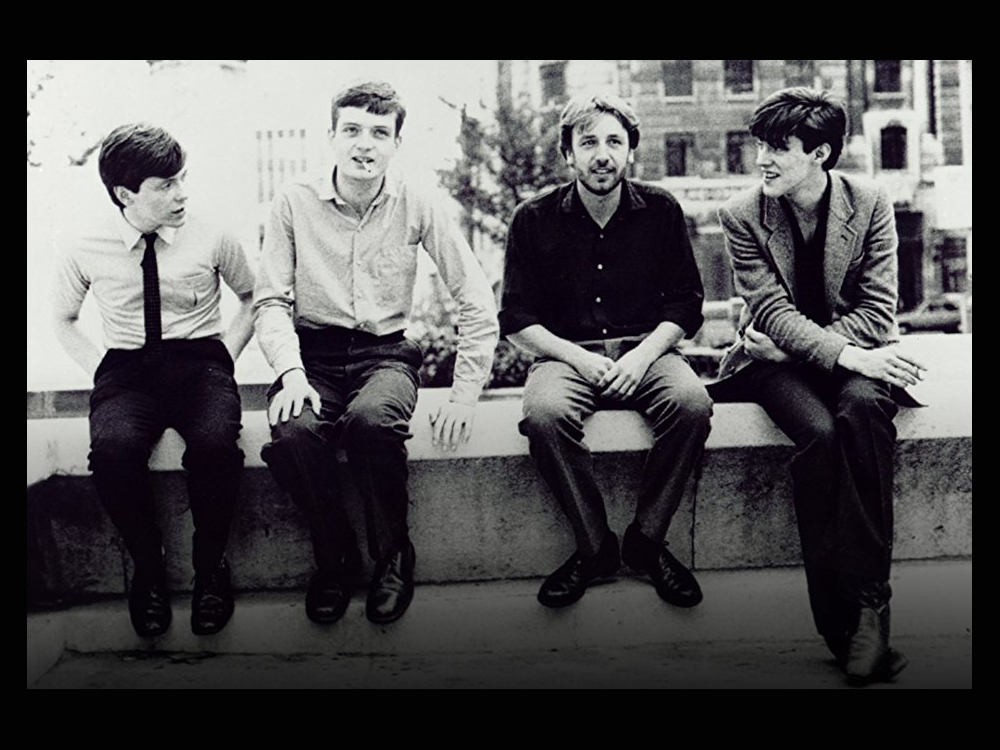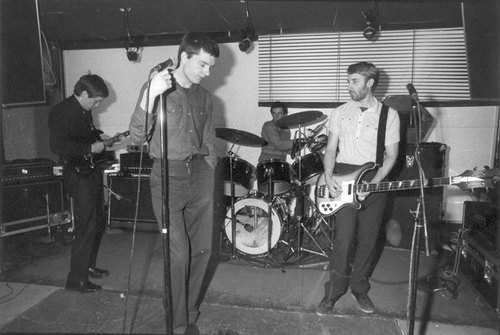LOADING CONTENT

but we're so happy
to come take me by the hand
that we've kept through our lives
A hint of Anaesthesia
let it ring on
Dance,
Dance,
Dance,
Dance,
lost
control
but lose the feeling
ABOUT

Joy Division were an English rock band formed in 1976 in Salford, Greater Manchester. Formed in the wake of the punk explosion in England, Joy Division became the first band in the post-punk movement by later emphasizing not anger and energy but mood and expression, pointing ahead to the rise of melancholy alternative music in the '80s. Though the group's raw initial sides fit the bill for any punk band, Joy Division later incorporated synthesizers (taboo in the low-tech world of '70s punk) and more haunting melodies, emphasized by the isolated, tortured lyrics of its lead vocalist, Ian Curtis. While the British punk movement shocked the world during the late '70s, Joy Division's quiet storm of musical restraint and emotive power proved to be just as important to independent music in the 1980s.
FORMATION

The band was founded in early 1977 by Guitarist Bernard Albrecht and bassist Peter Hook after a Sex Pistols concert and was originally called Warsaw. After placing an ad through a Manchester record store, they added vocalist Ian Curtis and drummer Stephen Morris. A name change to Joy Division in late 1977 -- necessitated by the punk band Warsaw Pakt -- was inspired by Karol Cetinsky's World War II novel The House of Dolls. (In the book, the term "joy division" was used as slang for concentration camp units wherein female inmates were forced to prostitute themselves for the enjoyment of Nazi soldiers.)
CAREER
Joy Division made their recorded debut in June 1978 when the band self-released An Ideal for Living,
and two weeks later their track "At a Later Date" was featured on the compilation album Short Circuit:
Live at the Electric Circus (which had been recorded live in October 1977).
The band recorded their debut album, Unknown Pleasures at Strawberry Studios, Stockport, in April 1979.
Producer Martin Hannett significantly altered their live sound, a fact that greatly displeased the band
at the time; however, in 2006, Hook said that in retrospect Hannet had done a good job and "created the
Joy Division sound". Unknown Pleasures was released in June and sold through its initial pressing of
10,000 copies. Wilson said the success turned the indie label into a true business and a "revolutionary
force" that operated outside of the major record label system.
CAREER
Joy Division toured Continental Europe in January 1980. Although the schedule was demanding, Curtis
experienced only two grand mal seizures, both in the final two months of the tour. That March, the band
recorded their second album, Closer, with Hannett at London's Britannia Row Studios. That month they
released the "Licht und Blindheit" single, with "Atmosphere" as the A-side and "Dead Souls" as the
B-side, on the French independent label Sordide Sentimental.
A lack of sleep and long hours destabilised Curtis's epilepsy, and his seizures became almost
uncontrollable. He often had seizures during performances, which some audience members believed was
part of the performance. The seizures left him feeling ashamed and depressed, and the band became
increasingly worried about Curtis's condition.
CAREER
Joy Division were scheduled to commence their first American tour in May 1980. Curtis had expressed
enthusiasm about the tour, but his relationship with his wife, Deborah, was under strain; Deborah was
excluded from the band's inner circle, and Curtis was having an affair with Belgian journalist and
music promoter Annik Honoré, whom he met on tour in Europe in 1979. He was also anxious about how
American audiences would react to his epilepsy.
The evening before the band were due to depart for America, Curtis returned to his Macclesfield home to
talk to Deborah. He asked her to drop an impending divorce suit, and asked her to leave him alone in
the house until he caught a train to Manchester the following morning. Early on 18 May 1980, having
spent the night watching the Werner Herzog film Stroszek, Curtis hanged himself in his kitchen. Deborah
discovered his body later that day when she returned.
CAREER
The suicide shocked the band and their management. In June 1980, Joy Division's single "Love Will Tear
Us Apart" was released, which hit number thirteen on the UK Singles Chart. In July 1980, Closerwas
released, and peaked at number six on the UK Albums Chart. NME reviewer Charles Shaar Murray wrote,
"Closer is as magnificent a memorial (for 'Joy Division' as much as for Ian Curtis) as any post-Presley
popular musician could have.
Morris said that even without Curtis's death, it was unlikely that Joy Division would have endured. The
members had made a pact long before Curtis's death that, should any member leave, the remaining members
would change the band name. The band re-formed as New Order, with Sumner on vocals; they later
recruited Morris's girlfriend Gillian Gilbert as keyboardist and second guitarist. New Order went on to
achieve worldwide success with hits like “Blue Monday” and “Bizzare Love Triangle.”
DISCOGRAPHY
Click on an album cover to learn more!
AN IDEAL FOR LIVING
An Ideal for Living is the first EP and official release by the English post-punk band Joy Division. It was released in 1978 by the band's own label, Enigma, shortly after the group changed its name from Warsaw.
All tracks were recorded at Pennine Sound Studios in Oldham on 14 December 1977. The recording sessions were self-financed by the band, on a budget of £400.
The release reflects the band's early punk influences, as opposed to the post-punk style they later developed.
UNKNOWN PLEASURES
Unknown Pleasures is the debut studio album by English rock band Joy Division, released on 15 June 1979 by Factory Records. The album was recorded and mixed over three successive weekends at Stockport's Strawberry Studios in April 1979, and was produced by Martin Hannett, who incorporated a number of unconventional production techniques into the group's sound. The cover artwork was designed by artist Peter Saville. It is the only Joy Division album released during lead singer Ian Curtis's lifetime.
The album has since become a cultural classic and has recently sprung new popularity within the alternative scene
CLOSER
Closer is the second and final studio album by English rock band Joy Division, released on 18 July 1980 by Factory Records. Produced by Martin Hannett, it was the band's first album following the suicide of lead singer Ian Curtis in May 1980.
Closer was recorded between 18–30 March 1980 at Britannia Row Studios in Islington, London. It is considered by many to be Joy Division's finest work.
IAN CURTIS
Curtis was born on 15 July 1956, at the Memorial Hospital in Stretford, Manchester, and grew up in a working-class household in Macclesfield, Cheshire.He was the first of two children born to Kevin and Doreen Curtis. From an early age, Curtis was a bookish and intelligent child, displaying a particular flair for poetry.
At a July 1976 Sex Pistols gig at Manchester's Lesser Free Trade Hall, Curtis encountered three childhood school friends named Bernard Sumner, Peter Hook, and Terry Mason.[13] The trio informed Curtis of their intentions to form a band, and Curtis informed them of his then-recent efforts to do likewise.
Curtis began suffering epileptic fits in late 1978. With his particular case being described by doctors as so severe, his "life would [be] ruled to obsolescence by his severe epilepsy"without the various strong dosages of medications he was prescribed. Throughout 1979 and 1980, Curtis's condition gradually worsened amid the pressure of performances and touring, with his seizures becoming more frequent and more intense
In the early hours of 18 May 1980, Curtis killed himself by hanging himself in the kitchen of his house at 77 Barton Street, Macclesfield. He was 23 years old ultimately ending Joy Division Permanently.
BERNARD SUMNER
Sumner was a founding member of Joy Division. He and childhood friend Peter Hook both attended the fabled Sex Pistols concert at Manchester's Free Trade Hall on July 20, 1976 and were inspired to form a band. Primarily known as the band's lead guitarist (his main guitars were a Gibson SG and a Shergold Custom Masquerader), Sumner also played keyboards for synthesizer parts and made his first vocal appearance on record singing the chorus of "Walked In Line" on the Warsaw album.
After Curtis’ suicide in May 1980 and the marking of the end of Joy Division, Sumner and his bandmates decided to go on and form a new band and create music under the name New Order. Sumner emerged as the band's permanent singer and lyricist, alongside playing guitar and keyboards. Through a series of splits and reformations, the band has released ten studio albums.
Sumner is widely credited in advancing UK dance music, and the popularization and technological advancement of sequencers. In the early 1990s, he collaborated with former Smiths guitarist Johnny Marr as Electronic.
PETER HOOK
Peter Hook (born Peter Woodhead; 13 February 1956) is an English singer, songwriter, composer, multi-instrumentalist and record producer. He is best known as the bassist and co-founder of English rock bands Joy Division and New Order.
On 20 July 1976, childhood friends Bernard Sumner and Hook separately attended a Sex Pistols show at the Manchester Lesser Free Trade Hall. The following day Hook borrowed £35 from his mother to buy his first bass guitar. Inspired by the performance, Sumner and Hook formed a band with their friend Terry Mason, who had also attended the show.
Hook formed the band which was to become Joy Division with Bernard Sumner in 1976. Following the death of lead singer Ian Curtis in 1980, the band reformed as New Order, and Hook played bass with them until 2007.
STEPHEN MORRIS
Stephen Paul David Morris was born on 28 October 1957, in Macclesfield, Cheshire, England. He attended the King's School, Macclesfield, as did Ian Curtis who was also in Joy Division. After Joy Division (then called Warsaw) tried three other drummers, they eventually recruited Morris, who responded to a wanted ad posted in a local music shop.
Morris is noted for his "machine-like" skills as a drummer, which he credits to krautrock influences. During Joy Division recording sessions with Martin Hannett, Morris was asked to record his parts one drum at a time so that Hannett could have complete control over the production. After Joy Division’s end, Morris went on with his fellow bandmates to form New Order.
He also took an early interest in drum machines, combining them with traditional drumming on many Joy Division and New Order releases.
LEGACY
Despite their short career, Joy Division have exerted a wide-reaching influence. John Bush of AllMusic argues that Joy Division "became the first band in the post-punk movement by ... emphasizing not anger and energy but mood and expression, pointing ahead to the rise of melancholy alternative music in the '80s."
Joy Division have influenced bands including their contemporaries U2 and the Cure to later acts such as Radiohead, Nine Inch Nails, Neurosis, Interpol, Bloc Party, the Editors and rap artists. Rapper Danny Brown named his album Atrocity Exhibition after the Joy Division song, whose title was partially inspired by the 1970 J. G. Ballard collection of condensed novels of the same name. In 2005, both New Order and Joy Division were inducted into the UK Music Hall of Fame.
The band's dark sound, which Martin Hannett described in 1979 as "dancing music with Gothic overtones", presaged the gothic rock genre. While the term "gothic" originally described a "doomy atmosphere" in music of the late 1970s, the term was soon applied to specific bands like Bauhaus that followed in the wake of Joy Division and Siouxsie and the Banshees. Standard musical fixtures of early gothic rock bands included "high-pitched post-Joy Division basslines usurp[ing] the melodic role" and "vocals that were either near operatic and Teutonic or deep, droning alloys of Jim Morrison and Ian Curtis."
- Classwork
- Independent Projects